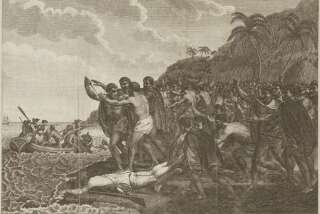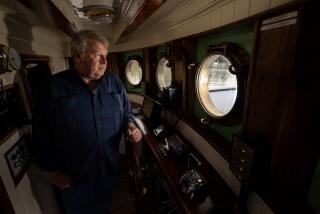Review: ‘Kon-Tiki’ a tale retold of determined seafarers
- Share via
“Kon-Tiki” is a ripping yarn torn from yesterday’s headlines. Though somewhat forgotten now, the 1947 story of six men, an oceangoing raft and a wild and crazy theory was a media sensation that gripped the world’s imagination — and launched a thousand tiki bars.
Though scientists then and now largely believe that the original inhabitants of Polynesia came eastward from Asia, Norwegian scientist and adventurer Thor Heyerdahl became convinced that they had come westward, from pre-Inca Peru, drifting over on the Humboldt Current on enormous balsa-wood rafts.
When no one took his theory seriously, Heyerdahl decided to re-create that 1,500-year-old voyage himself, building a raft, recruiting a crew and setting off on a 5,000-mile drift, roughly the distance between Chicago and Moscow, making sure to radio regular reports of his progress to an eager press. A documentary he made about the journey won an Oscar in 1951, and the book he wrote has sold more than 50 million copies in close to 70 languages. Let those disbelieving scientists match that, if they dare.
PHOTOS: Hollywood backlot moments
Based on that true story but willing to depart from it for dramatic purposes, “Kon-Tiki’s” tale bears an unexpected resemblance to another reality-derived movie set in the same late 1940s period, “42.” Like that Jackie Robinson biopic, “Kon-Tiki” features a protagonist who was determination itself, a filmmaking style that is square as opposed to cutting edge, and a story that is strong enough to involve us despite its earnest underpinnings.
“Kon-Tiki” is also unusual in that it was shot twice by directors Joachim Roenning and Espen Sandberg using the same actors: the Norwegian version was one of the best foreign-language Oscar nominees last year (it lost to “Amour”) and now we have the film in theatrical release in Scandinavian-accented English.
Heyerdahl’s strong-mindedness is visible from the film’s opening vignette, where we see him taking unsafe chances as a fearless leader of boys and nearly dying as a result. The lad’s father not surprisingly asks him to “promise me you’ll never take a risk like that again.” That promise is not forthcoming.
Next we cut to 1937 when Heyerdahl (now played by the uber-handsome Pal Hagen) and his young wife, Liv (Agnes Kittlesen), are doing research on the bucolic Polynesian isle of Fatu Hiva and formulating the theory that will take over his life.
Ten more years pass and Heyerdahl in 1946 finds himself in the same town as soon-to-be-Dodger Robinson: Who knows, they might even have passed on the street. The Norwegian is talking to a Brooklyn publisher, the last of many who say his theory is too far-fetched to be worthy of the hard covers of a published book.
A bit nonplused, which is saying something for this undauntable individual, Heyerdahl retreats to a local bar and meets one Herman Watzinger (Anders Baasmo Christiansen). He’s a former engineer turned refrigerator salesman who has tips about lashing the raft’s logs together and is so desperate for adventure he vows to follow Heyerdahl anywhere.
Mightily irritating his wife, expecting him back in Norway, the fearless leader is so jazzed by Herman’s enthusiasm he goes directly to Peru, where his crew of three other Norwegians and a Swede are soon ready to go. A conversation with the president of Peru leads to the necessary supplies and, on April 28, 1947, the six men, unaccountably wearing coats and ties, are given a hero’s send-off.
Here “Kon-Tiki” becomes a bit like “The Life of Pi” without the tiger as the crew faces the usual raft of open-water problems: big storms, bigger whales, menacing sharks and men overboard. Hoping for a little human drama, the film casts Herman as a neurotic weak link, an untruth that his surviving daughter lambasted to the Norwegian press as “character assassination.” Also not based on fact — but gory enough to earn the film a PG-13 rating for a “disturbing violent sequence” — is an episode of a shark being pulled on deck and gutted on the spot.
Through it all Heyerdahl never wavers, never stops exhorting the crew to believe in their mission. His leadership style is faith-based enough to be close to messianic. In fact, as everyone’s hair gets longer and the guys get buffer and tanner, by the time the voyage ends the crew is looking like a cross between a road show company of “Jesus Christ Superstar” and a male version of the Sports Illustrated swimsuit issue.
Academics argue exactly what if anything Heyerdahl’s astonishing journey proved, but no one disputes one comment the man made. “This is science,” he said, “that cannot be done behind a desk.” That’s a sentiment worth toasting in a tiki bar any day of the week.
---
“Kon-Tiki”
MPAA rating: PG-13 for a disturbing violent sequence
Running time: 1 hour, 41 minutes
Playing: In general release
---
ALSO:
In ‘Tricked,’ Paul Verhoeven turns fans into writers
‘Pain & Gain’ to strong-arm rivals at weekend box office
Tribute to a great cinematographer, Gabriel Figueroa, at LACMA
PHOTOS AND MORE
Roger Ebert: Career in pictures
ENVELOPE: The latest awards buzz
PHOTOS: Greatest box office flops
More to Read
Only good movies
Get the Indie Focus newsletter, Mark Olsen's weekly guide to the world of cinema.
You may occasionally receive promotional content from the Los Angeles Times.











